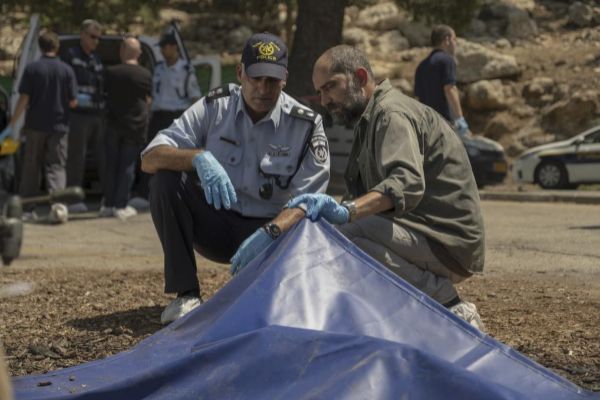A real fact: in 2014, three Israeli teenagers, ultra-orthodox students in a yeshiva , are kidnapped by members of Hamas. The Israeli media devote almost all of its programming to the event, thus creating a mixed climate of hope and anguish among the Jewish population. Concentrations follow to pray for his return home, with a latent suspicion at the bottom of that unlikely illusion. 18 days after the kidnapping , the bodies of the three kids appear on the outskirts of Hebron .
One day after the funeral of the unfortunate, three Israelis - an adult and two teenagers - kidnap Mohamed Abú Judeir, a 16-year-old Palestinian. His body appears charred in a gutter just outside Jerusalem. According to the forensic report, he was beaten, forced to drink gasoline and burned alive .
The symmetry of horror. The balance, in short, between all possible forms of barbarism when the patriotic ardor is allied with religious fervor.
Our Boys , a 10-chapter miniseries, reconstructs, with delayed sobriety, the days that go from Mohamed's kidnapping to the conclusion of the trial of the three defendants. Apart from the effectiveness of its dramatic treatment, from that sobriety that I have just pointed out, without falls in melodramatism, it is correct to show in crude the general inclination of the human being to turn the life of the neighbor into a hell, not until a god mediates, A flag or skin tone. Even though it is an Israeli production, with the support of American capital, there is no tendency here , but the equanimous exposition of a possibly irresolvable conflict, when irreconcilable superstitions, complementary extremisms and an inheritance of irredeemable hatreds come into play.
There is no belief, of any kind, that does not generate aberrations. There is no war that after all is not a civil war. Those killed by irrationality leave behind them not only pain, but also a hate circuit that feeds on itself . Great religions and great ideologies have small victims: ordinary people, the most helpless. In this case, three Israeli students, a Palestinian boy who has just fallen in love for the first time and two Israeli teenagers turned into executioners for grudges that they do not even understand and assume as an indispensable moral legacy.
A series, in short, that I risk recommending, not so much for its cinematographic values - but also - as for its good pulse in showing us the irrationality of a conflict perhaps irreversible, while suggesting the complexity of two societies - the Israeli and Palestinian - that, from the outside, we tend to imagine monolithic, when there are many - and antagonistic - the ideological strata that make up each of them.
Mohamed's murderers were sentenced to perpetuity. Mohamed was treated as a martyr by his compatriots, who, from the Gaza Strip, launched vindictive rockets into Israeli territories, which the Netanyahu government replied with air strikes that left more than 2,000 dead, mostly civilians .
To step on a different territory, although also managed by horror, there we have the fourth season of Gomorrah , a new stretch of Roberto Saviano's book. And good? Well, another festival of atrocities around the underworld of crime "dated to the Italian way", like the sonnets of the Marquis de Santillana. The first two seasons, set in that kind of jungle that is the Neapolitan suburb of Secondigliano, have, in my opinion, quite a lot of strength, which is weakening a bit in the third and fourth seasons, not only perhaps because of the insistence on a pattern invariable ("I kill you or you kill me, if a third party does not kill us before"), but also, perhaps, because their filmmakers decide to go from picaresque to epic , and that is where the codes of honor, the broad brush philosophisms about life and death, the tragic force of destiny, the dynasts enthroned over generations (and each generation is worse than the preceding one, even starting at the origin of the lousy), the wars of power between monarchs of the lumpen and all that kind of condiments. Beside this criminal epic, Game of Thrones seems the story of the 101 Dalmatians : here anyone blows your head shortly if another has not had the occurrence of flipping it before.
Implacable, otherwise, the radiography of greed, that psychological disorder consisting of having enough money to live as a king for 15 or 20 lives and risk the only life you have to get enough money to live at over 40 or 50 long lives.
Gomorrah could be an endless story, expand and stretch at pleasure , like the old-fashioned radio soap operas, since the story continues in real life, with its atrocious anecdote. Repeating a formula? Maybe, but the formula is pretty good.
According to the criteria of The Trust Project
Know more- culture
- Series
- Israel
- Palestine
- Quarrel
- Italy
- Mafia
Culture "Palestinian society has not written its history"
On the recordPaolo Borrometi: "I have no life, only fear"
CulturaOlga Arias: "I am already on the list of non-pleasant people for Israel"

